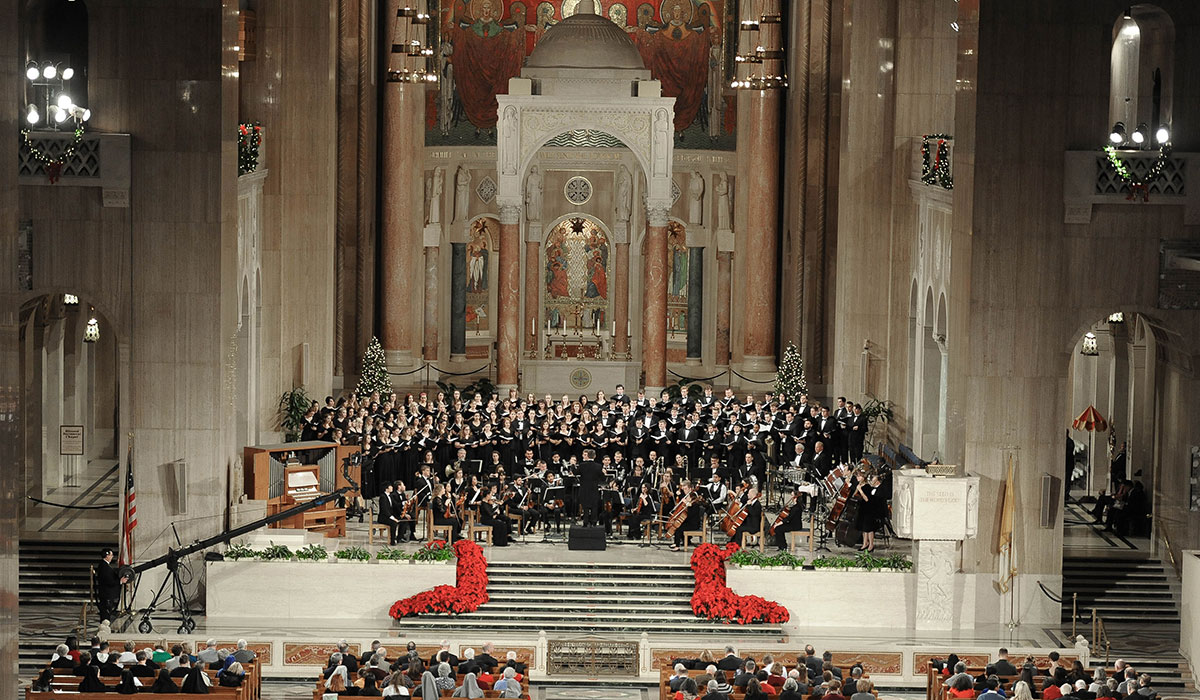
Concentrations in Choral Music and Organ
Entrance Requirements
Prior to submitting a formal application, persons interested in the Doctor of Musical Arts in Sacred Music degree must communicate with the director of the program.
The applicant must have completed the Master of Music in Sacred Music or equivalent. Acceptance as a graduate student by the Department of Music is required. A formal application to the D.M.A. in Sacred Music will include the following:
-
Letter of Application
-
Curriculum Vitae
-
A completed repertoire and professional experience record, obtainable at: academics/incoming-current-
music-students/index -
Two letters of recommendation (including one from a professional colleague, not a teacher of the applicant) attesting to the applicant's past and potential ability in the field of sacred music and music ministry;
-
Personal Statement relating the candidate's professional goals to the practice of Sacred Music (500-1000 words)
-
Pre-screening Performance Video:
-
For organists: 20-30 minutes of performance video, including multiple works in contrasting styles and from various periods.
-
For choral conductors: 20-30 minutes of conducting video (where the candidate is visible from the front) demonstrating works of contrasting styles; it is preferred to show examples of both rehearsal and performance if possible.
-
Invitation to campus for audition, interview, and testing is based on an evaluation of the application materials. Demonstration of conducting skills is required for both concentrations. Testing consists of demonstration of keyboard proficiency, open score-reading, and sight-singing. Repertoire for organ and conducting auditions will be stipulated upon invitation to the live on-campus audition
Written examinations (two hours each):
- music history placement examination;
- music theory placement examination;
- entrance examination in sacred and choral music.
In addition, the student must consult with the School of Theology and Religious Studies regarding prior equivalent course work, prerequisite courses, and/or testing-out procedures in the area of liturgical studies.
Placement and entrance examinations are given during the first and second semester registration periods.
The student must also demonstrate a reading knowledge of one foreign language and is expected to pass an examination in that language within one year after beginning doctoral studies. The language will be chosen in consultation with the director of the program.
Program of Study
Based on the results of the entrance requirements and examinations, the advisory committee, in conference with the student, will arrange a program of study of 61 to 72 hours beyond the master's degree. The courses to be completed as part of the degree requirements will be communicated to the student in writing.
The required treatise, on a topic approved by the advisory committee, must be in dissertation format and must explore in depth some aspect of sacred music. For the composer, the submission and performance of a treatise-composition approved by the advisory committee. The treatise is a substantive and formal scholarly research work addressing a specific topic in the field of sacred music. The treatise follows the same format as that required for a dissertation but is typically not equivalent to the dissertation in length or scope. It may treat of kinds of research other than those typical in dissertations, such as cataloging of works or repertory studies, or a compilation of choral works for various liturgical seasons and their performance needs. The treatise shares the following elements in common with the dissertation: topic approval by the faculty, with treatise topic approval form submitted to the Office of Graduate Studies; work written under the direction of the major professor and treatise committee; oral defense; deposit with the Office of Graduate Studies. The procedures for the treatise differ from those for the dissertation in the following elements: approval by the faculty constitutes the sole determinant of the appropriateness of the topic, and the topic does not require external review; members for the oral defense are chosen from the members of the music faculty, as well as theology faculty as may be deemed appropriate.
Oral Defense
Successful completion of an oral defense is required upon completion and acceptance of the treatise.
Graduation Requirements
Comprehensive Examinations (MUS 998A w/classes; MUS 998B w/o classes). At the completion of coursework, three four-hour written comprehensive examinations are required in:
- sacred and choral music;
- music history and music theory; and
- liturgical studies.
Upon the successful completion of all three comprehensive examinations, the student may be admitted to candidacy.
Minor in Latin American Music
The degree program consists of between 61 to 72 semester hours of credit beyond the master's degree. The above requirements apply with the following exceptions.
- Depending on the results of the entrance examination in the area of music history, the student may be assigned from 0-12 semester hours of credit in this area by advisement.
- The program of study will include 12 semester hours of Latin American music electives.
- The treatise must be written on an Iberian or Latin American topic.
For more information, please contact Peter Kadeli at kadeli@cua.edu
